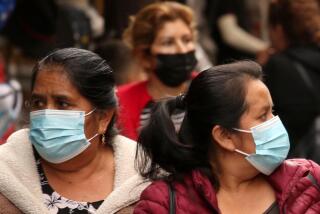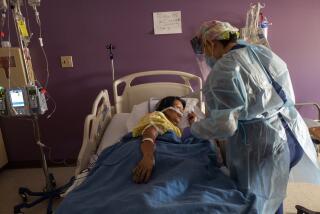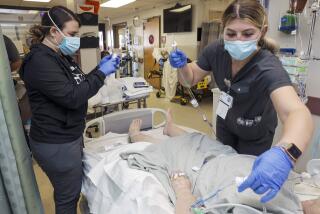Critically ill COVID-19 patients waiting days for ICU beds in Central California

- Share via
Some hospitals in Central California are still so overwhelmed with COVID-19 patients that some critically ill people are waiting days to be transferred into the intensive care unit from the emergency room, officials said.
One Fresno area hospital had nine critically ill patients who were unable to get into the intensive care unit for more than three days, interim health officer Dr. Rais Vohra said at a news conference this week. This forces emergency room staff to treat patients needing ICU care, disrupting the healthcare of other patients with less severe illness.
“We’re basically really straining what the emergency department has to do,” Vohra said. “We still anticipate at least a few more weeks of thoroughly impacted operations” in ICUs and emergency rooms.
Hospitals in Fresno County are teetering on the need to ration healthcare and implement “crisis standards of care,” Vohra said. In these situations, hospitals conclude that they can no longer provide the same standard of healthcare to everyone, and must choose whose lives to prioritize to keep as many patients alive as possible.
“We’re still just right there where we’re looking at things on a day-by-day — and even hour-by-hour — basis to see how we can match the resources with the needs,” Vohra said.
The state of Idaho recently declared that its hospitals statewide can provide only crisis standards of healthcare because of what state officials called a “massive increase of COVID-19 patients requiring hospitalization in all areas of the state.”
“The situation is dire — we don’t have enough resources to adequately treat the patients in our hospitals, whether you are there for COVID-19 or a heart attack or because of a car accident,” Dave Jeppesen, director of the Idaho Department of Health and Welfare, said in a statement. “The best way to end crisis standards of care is for more people to get vaccinated. It dramatically reduces your chances of having to go to the hospital if you do get sick from COVID-19.”
In Fresno County and the greater San Joaquin Valley, hospitals remain extremely busy, said Dan Lynch, director of the Central California Emergency Medical Services Agency. Most of Fresno County’s hospitals are running at 108% to 110% of standard capacity, while Clovis Community Medical Center near Fresno has been running at 130% of capacity.
“It just means that they’ve got patients in nooks and crannies throughout that hospital. And they’re taking advantage of every, every place they can to place patients safely,” Lynch said of the Clovis hospital. “We’re providing them with as much staff, and they’re finding staff from outside the state and other areas of the state of California to help them staff those beds.”
Officials have been forced to extend the policy by which not all patients calling 911 will be transported to emergency rooms if they don’t meet certain criteria to be transported. EMS officials had been hoping to relax that policy, but emergency rooms remain overwhelmed.
Lynch said he’s been pleading with federal officials to bring in additional staffing to support the hospitals.
Some help has arrived, in the form of several National Guard teams in the region, comprised of nurses and emergency medical technicians who can help aid emergency rooms.
But Lynch is still seeking federal medical teams who can provide the kind of care needed in intensive care units, “which is really what’s needed so we can expand our ICU surge beds. We have the capability of adding ICU beds to some of our hospitals — we just don’t have a staffing to do it. And that’s what those federal teams would do.”
More to Read
Sign up for Essential California
The most important California stories and recommendations in your inbox every morning.
You may occasionally receive promotional content from the Los Angeles Times.












